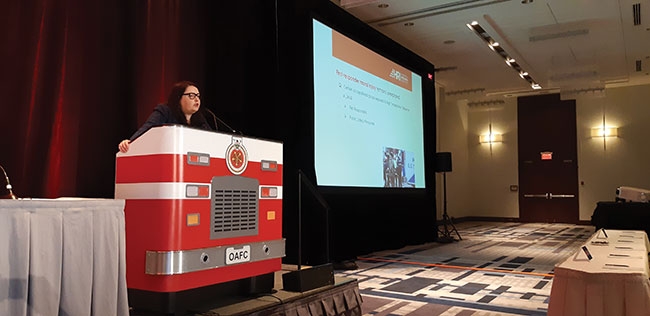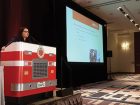
Association news
News
OAFC Labour Relations Seminar
Hundreds of fire service leaders and human resources personnel gathered at an Ontario Association of Fire Chiefs (OAFC) labour relations seminar in Toronto, Ont., on Jan. 23 and 24 to get a rundown on the latest legal and bargaining developments and lay of the land on a variety of subjects.
February 15, 2019
By
Grant Cameron
 Dr. Margaret McKinnon Hundreds of fire service leaders and human resources personnel gathered at an Ontario Association of Fire Chiefs (OAFC) labour relations seminar in Toronto
Dr. Margaret McKinnon Hundreds of fire service leaders and human resources personnel gathered at an Ontario Association of Fire Chiefs (OAFC) labour relations seminar in TorontoThe annual seminar, presented in partnership with labour and employment law firm Hicks Morley, featured presentations on diversity and inclusion, the #MeToo movement, new directions in PTSD treatment, cannabis in the workplace and how to accommodate pregnant firefighters.
The event, at the downtown Hilton, kicked off with a presentation on new directions in PTSD prevention and treatment of public safety personnel by Dr. Margaret McKinnon, research chair in mental health and trauma at the Guelph, Ont.-based Homewood Research Institute, an organization dedicated to research designed to evaluate and transform mental health and addiction services.
McKinnon said she was excited to be at the seminar and talk to fire chiefs about PTSD because there’s a lot of hope surrounding treatment of the dysfunction in public safety personnel.
“I want to deliver a message of hope around PTSD and let you know that people can return to work and they can recover,” she said.
While strides are being made into treatment to help people like firefighters recover from PTSD, McKinnon cautioned there are still hurdles to overcome and professionals must continue their efforts, as it’s estimated that about 10 per cent of first responders worldwide are affected by the disorder.
“People can definitely get better from PTSD,” she said. “But I want to add to that message of hope that there’s also a lot of work to do.
“We do a good job, but we need to do a better job.”
Michael Bach, founder and CEO of the Canadian Centre for Diversity and Inclusion which helps employers with the issues, led a session aimed at making the business case for a more inclusive fire service.
He said diversity and inclusion are “buzz words” used by politicians almost daily, but society and the fire service still have work to do.
The 2016 census, he noted, showed that women make up 49 per cent of the workforce, yet only four per cent of the fire service is female, and most of the leaders are white males.
Bach outlined how the fire service can become more inclusive, one way being for leaders to look at their organizations through a “diversity lens” to determine if there are barriers or policies that prevent diversity and inclusivity.
Communications strategist Karen Gordon of Gordon Strategy, and Lauri Reesor, a partner at Hicks Morley, led a session on the MeToo movement and outlined steps fire chiefs should take to make the workplace culture more proactive on gender issues and protect themselves from harassment complaints.
They offered some practical tips, explained pitfalls to avoid and also why it’s important to bring in a team of legal and communications professionals to craft a response if a harassment claim is filed.
Gordon said MeToo allegations are serious business and the speed at which things move via social media after a charge is levied is terrifying for people and organizations that are in the crosshairs.
In law, people are innocent until they’re proven guilty, she noted, but that’s not always the case with a MeToo allegation.
“It’s a stark reality we’re living in now.”
Reesor said MeToo allegations can take on a life of their own and, if a charge is levied against a fire department, it’s not only the municipality, but also the fire chief that will end up in the hot seat.
She warned that harassment can include a single incident and problems could arise from a “wolf whistle” directed at a female employee at work to pictures of naked women posted in a male’s locker.
She noted that the intention of the person who’s accused doesn’t matter, as the legal question is merely whether it happened.
“It’s really important to nip this stuff in the bud,” she said.
A panel of experts discussed cannabis in the workplace, talked about misconceptions surrounding the drug and explained the new federal law that came into effect last October making recreational use of cannabis legal in Canada, although it’s up to each province how to regulate matters.
The panel consisted of Hicks Morley partner Maureen Quinlan and law firm associate Jacqueline Luksha, Dr. Melissa Snider-Adler, chief medical review officer at DriverCheck, a provider of medical testing and assessments for workplaces, and Tom Wilson, program consultant at DriverCheck.
Snider-Adler told the audience that cannabis affects people differently and significant cognitive impairment from the drug can last for weeks. She also noted that workers should not be allowed to perform dangerous work or work on safety-sensitive jobsites if they’ve used cannabis 48 hours earlier.
Wilson spoke to the obvious signs of cannabis use like red eyes and lack of motivation by an employee. He also said the drug can lead to increased appetite and have a cumulative effect over time.
Wilson said fire departments should have policies in place that clearly outline the rules of cannabis use for firefighters.
A session on how to accommodate pregnant firefighters was presented by Hicks Morley labour and employment lawyer Carolyn Kay.
She explained that departments must accommodate a pregnant firefighter and failure to conduct a comprehensive search for solutions can give rise to liability.
She said a pregnant firefighter must also be prepared to offer solutions and accept reasonable accommodation proposals.
Kay said fire departments can consider how to modify a job or change the work environment for the employee and, if it can’t, should look at other positions within the fire service that might be appropriate.
Also at the seminar:
- An update on bargaining was provided by Hicks Morley labour and employment lawyers Julia Nanos and Stephanie Jeronimo. They reviewed the settlements and interest arbitration awards in the fire sector over the last year.
- Mark Mason and Paul Schwartzman, labour and employment lawyers at Hicks Morley, reviewed the latest legal developments and issues facing municipalities and employers.
- A session on PTSD and chronic mental stress was presented by Hicks Morley lawyer Mariana Kamenetsky, who reviewed and explained various policies and steps employers can take.
- A meet-the-arbitrator session was presented by Paula Knopf, an arbitrator and mediator who has been active in labour relations and dispute resolution in the public and private sectors since 1980. The session was moderated by lawyer Jeronimo of Hicks Morley.
Print this page

